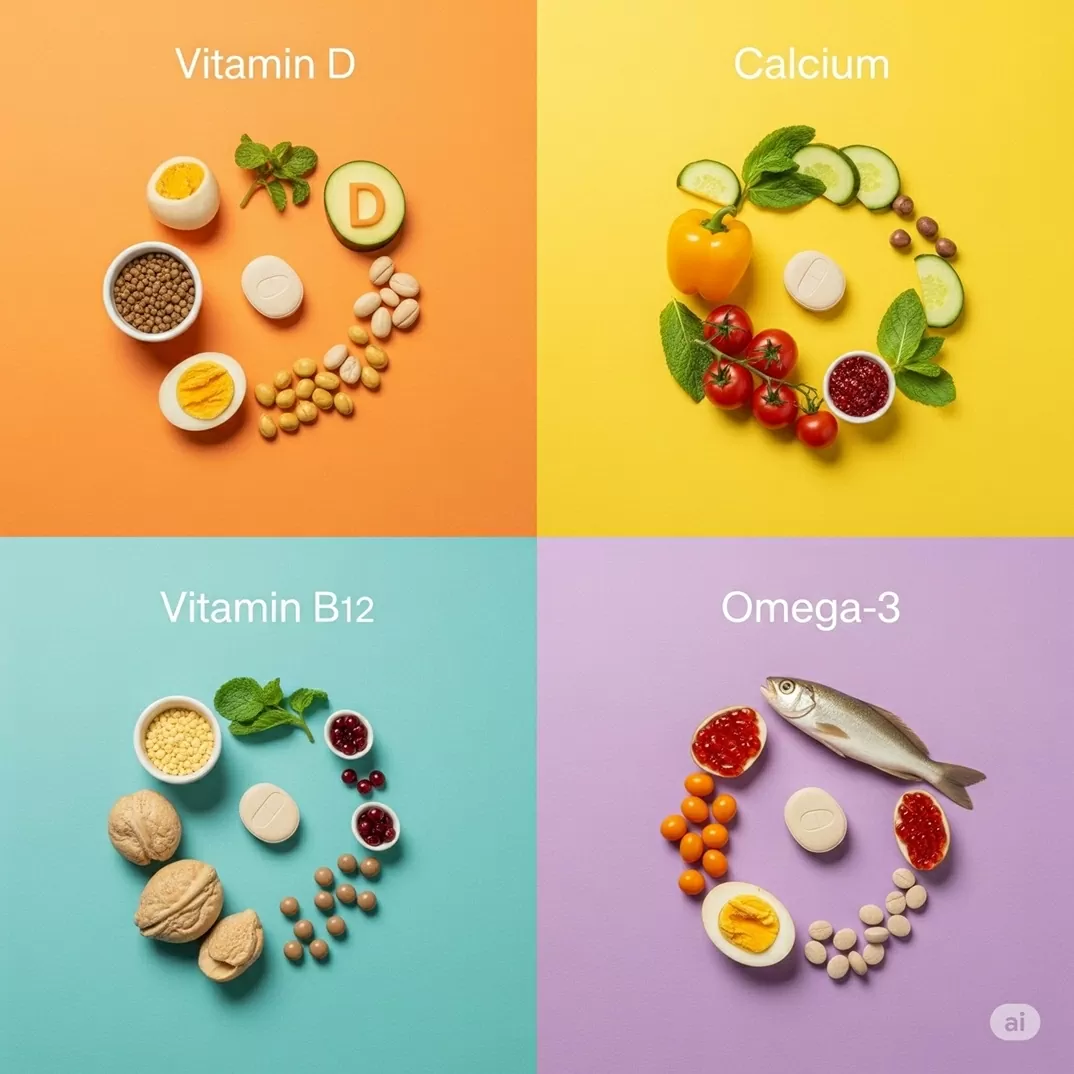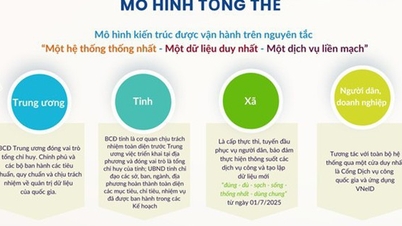 |
| Dietary supplements can support healthy aging but cannot replace a balanced diet and healthy lifestyle. (Illustration image generated by AI) |
Turning 40 is an important milestone - a time to set new goals, look back on your health journey, and proactively take care of your body for the road ahead.
While a balanced diet is always the foundation, supplements can sometimes play a supporting role, helping to fill nutritional gaps that come with age.
The four supplements below are recommended by US nutrition experts to support healthy aging for people 40 and older, along with practical tips to boost overall health.
Vitamin D
Vitamin D plays an important role in bone health, immune function and muscle support, making it especially important as we age. Unfortunately, vitamin D deficiency is quite common, even in middle-aged women.
"If you're a woman over 40, declining estrogen levels make it harder for your body to absorb vitamin D," says Holly Larson, MD, PhD, a registered dietitian in Ohio who specializes in women's health. "I recommend getting your vitamin D blood levels checked annually and supplementing to maintain ideal levels."
Current guidelines suggest that consuming about 400-800 International Units, or 10-20 micrograms, of vitamin D will meet the needs of 97%-98% of healthy people.
Everyone's needs can be different, so it's best to talk to your healthcare professional to determine your ideal level.
Calcium
Calcium plays an essential role in maintaining strong bones and teeth; its importance increases with age – especially for women, who are at higher risk of osteoporosis after menopause.
Although milk, green leafy vegetables, and fortified foods are good sources of calcium, dietary intake is not always sufficient to meet daily needs.
"In cases where it's not possible to get enough through food, calcium supplements can help maintain bone strength and reduce the risk of fractures," says nutritionist Drew Hemler.
Hemler also notes that, for older adults, calcium citrate is preferred over calcium carbonate because it is better absorbed even when stomach acid is reduced—a common condition with aging—and can be taken with or without food.
Calcium supplements are also especially helpful for people who have difficulty getting enough through diet, such as those who are lactose intolerant or on restricted diets.
Vitamin B12
Vitamin B12 plays an important role in red blood cell formation, nerve function, and DNA synthesis. As we age, our ability to absorb certain nutrients—especially vitamin B12—begins to decline, says nutritionist Tammie S. Brown.
The cause may be due to reduced stomach acid and endogenous factors - both of which are needed to break down and absorb this vitamin from food.
Dietitian Yvette Hill says reduced vitamin B12 absorption can also be linked to certain medications. Many common prescription drugs – including proton pump inhibitors, metformin and some diuretics – can interfere with the body’s ability to absorb essential micronutrients like B12.
Therefore, middle-aged and elderly people should regularly discuss with their doctor the list of medications they are taking and consider supplementing vitamin B12 if necessary.
Omega-3
Omega-3 is a type of polyunsaturated fat known for its anti-inflammatory properties, which are particularly beneficial for the heart and brain. The two main forms of omega-3, EPA and DHA, play a key role, and are found in fatty fish such as salmon, mackerel, and sardines.
As we age, our risk of chronic diseases like heart disease and cognitive decline also increases, making omega-3s an important part of any healthy aging plan.
Many studies have shown that adequate EPA and DHA supplementation is associated with a reduced risk of Alzheimer's disease and cognitive decline. In addition, omega-3 also helps improve blood circulation by maintaining blood vessel elasticity and increasing cardiovascular efficiency.
To meet your omega-3 needs, eat at least two servings of fatty fish each week. If you don’t eat fish regularly, consider taking a fish oil or algae-derived omega-3 supplement.
However, consult your doctor before use.
Other notes at age 40
Taking care of your body goes beyond just taking vitamins and minerals. Here are some additional strategies to help you maintain lasting health as you enter middle age:
Prioritize diet first
While dietary supplements can support healthy aging, they are not a substitute for a balanced diet and healthy lifestyle.
"Supplements should be supportive, not a replacement for diet," says expert Tammie S. Brown. "They're only really necessary when the body is identified as having a micronutrient deficiency or when diet isn't adequate."
Musculoskeletal strength training
Weight-bearing exercises like weightlifting, planking, squats, etc. help build and maintain muscle mass as well as bone density - two factors that gradually decline with age.
Limit alcohol
Alcohol can reduce the ability to absorb nutrients and increase inflammation in the body - factors that increase the risk of chronic disease and micronutrient deficiencies.
Eat lots of fiber
Fiber aids digestion and promotes heart health. Include whole grains, vegetables, fruits, and legumes in your daily diet.
Regular health check-ups
Don't skip important tests such as blood pressure, blood lipids, bone density... to detect early and control common health problems in middle age.
Personalize your health care plan
Everyone has different needs, not just based on age. Expert Monique Richard notes: "The choice of supplement should be based on personal goals, current health status, access, genetics, and many other factors - not just age."
Source: https://baoquocte.vn/bon-thuc-pham-bo-sung-va-nhung-dieu-can-luu-y-cho-do-tuoi-40-tro-len-323602.html





![[Photo] Discover unique experiences at the first World Cultural Festival](https://vphoto.vietnam.vn/thumb/1200x675/vietnam/resource/IMAGE/2025/10/11/1760198064937_le-hoi-van-hoa-4199-3623-jpg.webp)
































![[Photo] General Secretary attends the parade to celebrate the 80th anniversary of the founding of the Korean Workers' Party](https://vphoto.vietnam.vn/thumb/1200x675/vietnam/resource/IMAGE/2025/10/11/1760150039564_vna-potal-tong-bi-thu-du-le-duyet-binh-ky-niem-80-nam-thanh-lap-dang-lao-dong-trieu-tien-8331994-jpg.webp)





























![[Photo] General Secretary attends the 80th Anniversary of the Traditional Day of the Armed Forces of Military Region 4](https://vphoto.vietnam.vn/thumb/402x226/vietnam/resource/IMAGE/2025/10/12/1760265970415_image.jpeg)




































Comment (0)